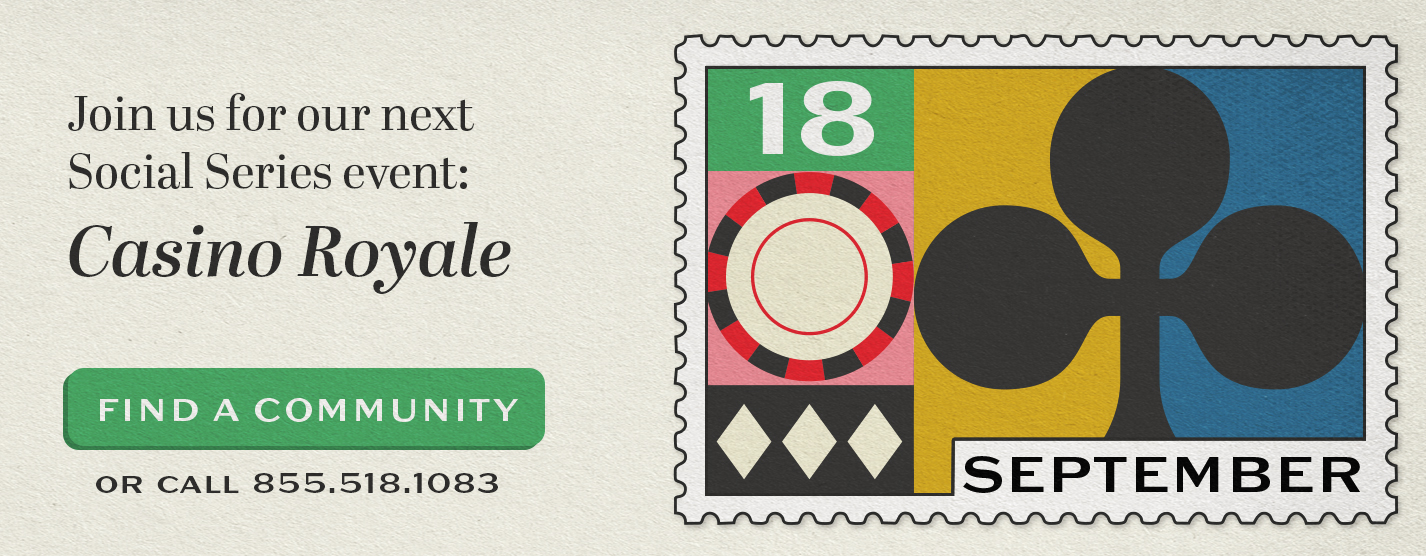When you think of games like blackjack and poker, you might imagine dazzling lights, bustling card tables and high stakes drama. But a night of playing cards can be a much more relaxing and joyful affair – one that offers a number of social, cognitive and emotional health benefits for seniors.
Why card game nights are great for older adults
Card games offer older adults a chance to laugh and have fun in a relaxed social setting. Winning bridge games with a teammate and developing friendly poker rivalries can be rewarding experiences that strengthen friendships, reducing loneliness and isolation. In many retirement communities, card game nights become a consistent weekly or monthly event to look forward to, helping to reinforce the sense of purpose that comes with adopting new hobbies and passions.
Playing card games is also linked to several health benefits for seniors.
One study found that older adults who regularly play card games displayed better cognitive performance and reduced brain atrophy. Remembering rules and staying alert to developments in the game can strengthen concentration and short-term memory. Games that require strategy, decision making and risk assessment keep the brain stimulated.
Engaging in leisurely social activities like card games can help boost mood and relieve stress by triggering the release of dopamine and endorphins. Even the simple acts of shuffling, dealing and organizing cards can help maintain motor skills and dexterity.
Choose some classic card games
Classic card games are ideal for game nights: Many people are already familiar with the rules, they don’t require much more than a deck of cards and the pace of play allows for plenty of freewheeling conversation.
Some of the games below are casino classics that can be played at home for low stakes by substituting chips for cash and having players take turns acting as the dealer. Others are timeless card games that have brought friends together for decades. The social banter and camaraderie that naturally develop over the course of a game of cards is often the most rewarding part of playing.
When choosing your games, consider whether your guests would prefer more complex games like poker and bridge, simpler ones like rummy and blackjack, or a mix of both. For larger gatherings, you might offer several games to be played at different tables.
Here are six classic card games ideal for senior game nights.
1. Go fish
The simplicity and relaxed pace of go fish make it especially welcoming for beginners or those looking for a lighthearted social activity. Players ask one another for specific cards (for example: “Do you have any sevens?”) in an effort to collect sets of four. If the opponent has the requested card, they must hand it over; if not, the player is told to “go fish” by drawing from the deck. The game continues until all sets are made, and the player with the most completed sets wins.
2. Gin rummy
A classic two-player favorite, gin rummy combines luck with strategy. The goal is to form “melds” of cards – either three or four of a kind (like three 9s) or runs of three or more cards in sequence (such as 4-5-6 of hearts). Players take turns drawing and discarding, working to organize their hands before their opponent does. A round ends when one player “knocks,” showing that most of their cards are in melds with only a few unmatched. It’s a quick, engaging game that sharpens the mind while rewarding thoughtful planning.
3. Rummy
The “big sibling” of gin rummy, classic rummy is designed for more than two players and is a favorite at group gatherings. Like gin rummy, players aim to create sets and runs, but the game continues until one player has successfully laid down all their cards. Scoring is typically based on the value of the remaining cards in each player’s hand, with face cards worth ten and others worth their face value. Rummy is accessible and social yet still requires strategy and planning.
4. Bridge
For those who enjoy deeper strategy and teamwork, bridge is a classic four-player partnership game. Players work with their partners to win “tricks” (rounds of cards) by playing higher-value cards or suits. The game includes a bidding phase, where players signal their hands’ strengths and set goals for the number of tricks they’ll win. Bridge is considered one of the most intellectually stimulating card games, requiring focus, strategy and cooperation.
5. Blackjack
Also known as “21,” blackjack is a casino staple that’s easy to pick up and exciting to play. The goal is simple: Beat the dealer by getting your hand total as close to 21 as possible without going over. Number cards count at face value, face cards are worth 10 and aces can count as 1 or 11. Players must decide whether to “hit” (draw another card) or “stand” (keep their total) as they weigh the risks and rewards. Its mix of chance, calculated decisions and suspense makes it a lively choice for group play.
6. Poker
Poker comes in many variations, but the essence is the same: Players compete to build the strongest hand – or bluff their way to victory. Each round involves betting, drawing or exchanging cards, and revealing hands to determine the winner. The most popular version of poker, Texas Hold ’Em, deals two private cards to each player and five community cards face up, which everyone can use to build their best hand of five. Poker combines probability calculation, strategic thinking and taking risks, making it both thrilling and mentally stimulating. Seniors often enjoy the game not just for the challenge, but also for the social banter and camaraderie that naturally develop around the table.
Tips for hosting a fun card game night
When organizing a card game night at your home or independent living community, you don’t need to go full Monte Carlo on your game night décor. Comfortable seating, good lighting and plenty of table space are the essentials. A playlist of jazz standards or soft instrumentals can keep the mood festive without being distracting. Snacks and beverages like finger foods, fruit trays and mocktails can help keep players’ energy high.
A card game night should feel inviting and celebratory, encouraging everyone to join in the fun, whether they’re seasoned players or curious beginners. Consider providing large-print handouts or downloadable PDFs that clearly explain the rules of the game – for example, someone new to poker might want a hierarchy of poker hands to refer to.
Finally, set an ending time for the evening to prevent fatigue. Aim for two or three hours with breaks.
Play your way to better health
Card games have long been popular pastimes in retirement communities and among older adults at home. But beyond the fun and entertainment, they carry significant cognitive and emotional benefits. When thoughtfully hosted, a card game night can provide older adults with the perfect balance of mental stimulation, social engagement and good old-fashioned fun.
Looking for some friends to play cards with? Find a Holiday Senior Living location near you.

You might also like
Want to learn more about life at Holiday?
